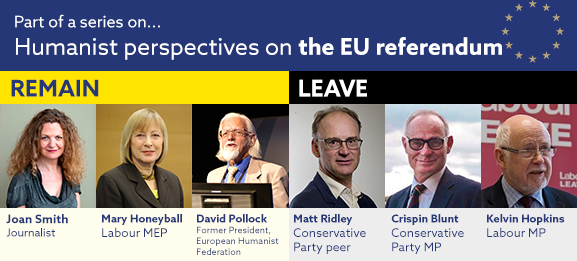This blog is part of a series of perspectives on the EU referendum from prominent humanists on either side of the debate. Each puts forward a humanist case for the United Kingdom either remaining a member of, or leaving, the European Union. All six perspectives are linked in the image below.

Joan Smith: The humanist case for staying in the EU
Ideas know no boundaries. For at least two-and-a-half thousand years, Europe has been the testing ground of ideas about who we are, why we are here and the best way to live. From Greek philosophers to French anti-theists and the English and Scots thinkers who played a key role in the Enlightenment, European thinkers have driven forward the march of progressive ideas. They’ve done it against a tragic background of internecine warfare, pitting neighbours against each other in some of the most terrible conflicts to disfigure the planet.
Against the odds, the EU has persuaded huge numbers of people to focus on what unites us rather than old divisions – just look at all the individuals and institutions outside the UK pleading with us to stay. As I write, we are part of a community of more than 500 million people living in countries with a commitment to shared values and universal human rights. Those values are vital to humanists, creating a legal framework in which we are protected from age-old demands from religious and other extremists who would like to impose their beliefs on people who don’t share them.
I love living in a European community where my right not to have a religion is protected by law. I love the fact that no member state of the EU can use barbaric punishments like the death penalty. I love the fact that equality is at the heart of the European ideal, challenging centuries of bigotry (much of it sanctioned by church and state) towards women, the disabled and LGBT people. Of course individual countries could do this on their own but it’s easier – and our hard-won rights are easier to protect – when we are part of a larger whole.
I am proud of what Europe has become since the Second World War. I don’t think for one moment that it has destroyed the nasty side of human nature, and I have watched the rise of xenophobic forms of nationalism in some European countries with horror. But I think we are stronger when our political leaders recognise that they are part of project based on universal values and respect, drawing strength from each other. That is more important for me than the economic arguments, which are in any case a no-brainer.
I live in a continent influenced by Plato, Galileo, Voltaire, Simone de Beauvoir, people with inventive minds who shaped what it means to be modern. As a humanist, I don’t want to return to the petty nationalisms and squabbles which have torn Europeans apart so many times in the past. The EU isn’t perfect but I want to remain part of a community with a commitment to equality that’s made the lives of so many people immeasurably better.
Whatever one thinks of immigration the fact remaims that population pressure is the major threat to the world as we have known it. It is the root cause of all the major problems in the world today, destruction of natural habitats to grow more crops resulting in other life forms becoming extinct and droughts and floods resulting from these actions. This country is already grossly overpopulated. If we had to rely on food produced in this country without imports we couldn’t continue. Other countries have burgeoning birth rates and will be in no position to export us food they need themselves in the future. We have to be realistic and put up a notice – This Country is Full (actually overfull) The multiplicity of interest by different countries in the European community means no agreement is ever going to be reached. It is a heaven for bureaucrats who live luxurious lives at our expense and are out of touch with everyday life. It is a millstone rolling towards a cliff edge and the sooner we are out of it the better as it is destined to fail as did the Russian Federation and Yugoslavia – both conglomerations of groups of people with different languages and customs. If we have a government of our own we can vote them out for an alternative. We can’t do that with the hierarchy of the European Union. The well known saying that the larger the committee the less effective it is is all too true. WE should definitely leave this failed organisation.
Being part of a progressive caring Europe has brought about some of the best legislation we have seen – and these would never have been achieved without the EU. I just hope that we will survive whatever comes next. It would be nice to know the plans.
You must be living in Cloud Cuckoo Land if you think all the morass of red tape and regulations produced by a group of lofty individuals far removed from contact with the average person has been a good thing. Their object is to create a bureaucratic super state which will be just Dictatorship by the back door. Fortunately the seeds of its own destruction are now starting to appear, be grateful we have exited from this monster before the ultimate crash.